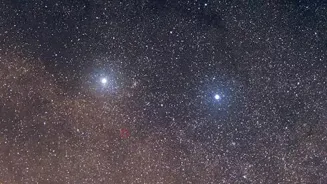Here are today’s most important updates from the realm of Science and Space.
The Cosmic Neighbor We’ve Been Waiting For: Habitable Planet Detected
Astronomers may have uncovered a promising new candidate for extraterrestrial
life, right in our stellar neighbourhood. Using the James Webb Space Telescope (JWST), researchers have detected what appears to be a giant exoplanet orbiting Alpha Centauri A, the closest solar twin to our Sun. Located within the Alpha Centauri triple star system, this planet, tentatively named Alpha Centauri Ab, occupies the star's habitable zone, the optimal distance for liquid water to exist on its surface. The discovery, made possible through direct imaging, marks a significant milestone in exoplanet science. If confirmed, this would be the first time such a potentially habitable planet has been identified around our nearest Sun-like neighbour.
Cosmic Curiosity: Helmet-Like Rock Found on Red Planet

NASA's Mars Perseverance rover captured an image of a volcano-shaped rock resembling a weathered battle helmet. The rover is currently looking for ancient life on Mars, and also collecting samples of rock for possible Earth return. During the process, the rover often stumbles upon curious rocks. According to a reports, the helmet-like rock would help scientists to understand the environmental history of Mars. Scientists believe the rock's unique shape and texture could be the result of chemical weathering, mineral precipitation, or volcanic processes. The rock is composed of spherules, which are tiny, perfectly shaped spheres that have sparked debate among scientists about their origin.
When AI Meets the Stars: Discovery of a One-of-a-Kind Supernova

Astronomers may have uncovered a never-before-seen type of stellar explosion after artificial intelligence, inspired by the way Spotify recommends music, flagged a peculiar event in deep space. The discovery is named SN 2023zkd. Unlike typical detections that rely on chance, this one was guided by an AI system trained to identify unusual night-sky activity in real time. SN 2023zkd initially appeared to be an ordinary supernova, but closer inspection revealed strange behaviour. Located about 730 million light years away, the explosion first brightened, dimmed, and then unexpectedly brightened again. The algorithm used in the discovery is called Lightcurve Anomaly Identification and Similarity Search (LAISS). Built on the recommendation model that powers Spotify, LAISS scans astronomical data for anomalies by comparing light signals with a large dataset of known objects.
The Next Frontier: Vaccines Aim to Shield Minds from Dementia

Over the past two centuries, vaccines have been critical for preventing infectious diseases. The World Health Organization estimates that vaccination prevents between 3 million and 5 million deaths annually from diseases like diphtheria, tetanus, influenza, measles and, more recently, COVID-19. New research has found tantalizing evidence that the herpes zoster — or shingles — vaccine could lower the risk of dementia in the general population by as much as 20%. There is a possibility that the vaccine may have conferred protection by activating the immune system and providing "trained immunity," in which the immune system is strengthened by repeated exposure to vaccines or viruses.a















